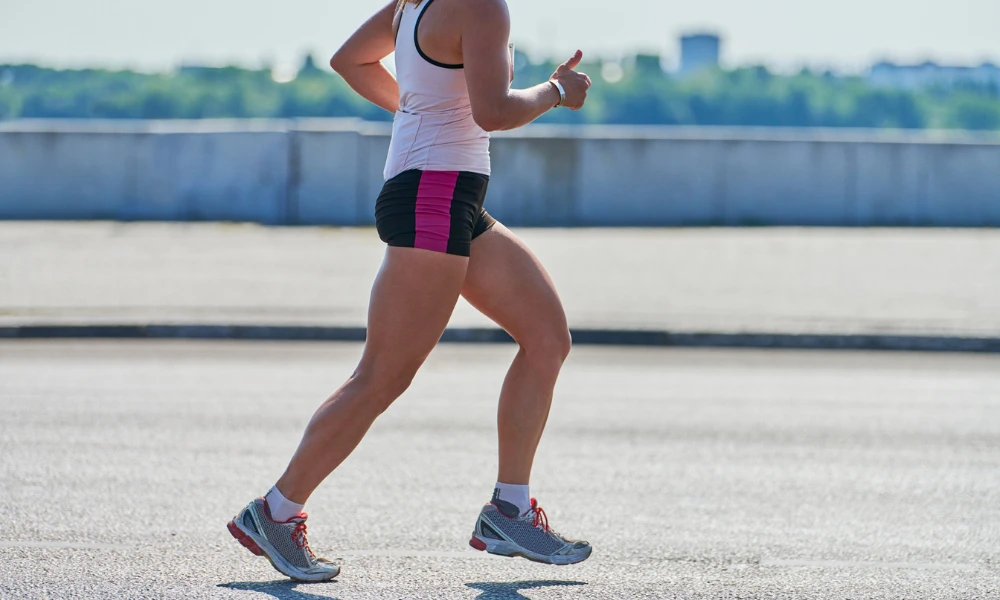Unfortunately, the XXI century has kept us behind office desks and in car seats, installed elevators and escalators everywhere, and thus deprived us of the opportunity to move a lot.
Running and walking are physical activities that are the basis of a healthy lifestyle.
If you’re trying to lose weight, you might wonder: Is running or walking better for weight loss? Some people swear by running, while others prefer walking as a low-impact way to burn calories. But which one helps you shed pounds faster?
The short answer: Both can help you lose weight, but running burns more calories in less time. However, walking has its benefits, especially for beginners or people with joint pain.
In this article, we’ll compare the calorie burn, fat loss, metabolism boost, and overall effectiveness of running and walking, backed by accurate data and science.
What Expert Say?

In an interview with the Sun, personal trainer James Barr explained what is better and safer for humans: walking or running.
“Although running burns twice as many calories per minute, you shouldn’t discount walking. It has many health benefits and can be a much more effective workout for some people. Firstly, about the overall benefits of walking – it is a form of cardiovascular exercise that helps improve the heart and lungs’ efficiency, ” the trainer said.
The trainer also said that walking for at least half an hour five days a week can reduce the risk of heart disease by 19%, and walking for at least 15 minutes after breakfast, lunch and dinner improves blood sugar levels more than a 45-minute walk at other times during the day.
All walking exercises increase blood circulation, including in the brain, improving cognitive function and increasing mental concentration and alertness. He says: “This makes it easier to perform everyday tasks and increases productivity.”
The Science of Weight Loss: How Your Body Burns Fat
Let’s quickly understand how weight loss works.
You lose weight when you burn more calories than you consume. This is called the calories in vs. calories out (CICO) principle.
- Calories in: The food and drinks you consume.
- Calories out: The energy your body burns through movement and basic functions (breathing, digestion, etc.).
The faster you burn calories, the quicker you lose weight. This is why we compare calories burned in running to those burned in walking.
Calories Burned: Running vs. Walking
Research from Harvard Medical School shows running burns more calories than walking because it’s a high-intensity activity. Here’s how they compare:
| Activity | Speed | 125 lbs (57 kg) | 155 lbs (70 kg) | 185 lbs (84 kg) |
|---|---|---|---|---|
| Walking | 3 mph (4.8 km/h) | 198 kcal/hr | 232 kcal/hr | 266 kcal/hr |
| Walking | 4 mph (6.4 km/h) | 255 kcal/hr | 300 kcal/hr | 345 kcal/hr |
| Running | 5 mph (8 km/h) | 480 kcal/hr | 576 kcal/hr | 672 kcal/hr |
| Running | 6 mph (9.7 km/h) | 600 kcal/hr | 720 kcal/hr | 840 kcal/hr |
- Running at 5 mph burns more than double the calories of walking at 3 mph.
- The faster you run, the more calories you burn.
- If you prefer walking, increasing your speed to 4 mph or adding an incline helps burn more calories.
Does Running or Walking Burn More Fat?
Both running and walking help with fat loss, but in different ways.
- Walking burns a higher percentage of fat because it’s a low-intensity activity.
- Running burns more total calories, which results in more fat loss over time.
According to research published in the American Journal of Clinical Nutrition, fat oxidation (fat burning) occurs at lower intensities, such as walking. However, the total number of calories burned plays the most critical role in weight loss.
Myth: The “Fat-Burning Zone” is the Best for Weight Loss
Many people think walking is better for fat loss because it keeps you in the “fat-burning zone.” While it’s true that low-intensity exercise burns a higher percentage of fat, running burns more total fat because it burns more calories overall.
Bottom line: If you want to burn fat faster, focus on burning more total calories, not just the fat-burning zone.
Why Running Burns More Calories Even After You Stop
Another reason running is better for weight loss is EPOC (Excess Post-Exercise Oxygen Consumption)—also known as the afterburn effect.
- After a run, your body keeps burning calories for hours to recover.
- This doesn’t happen much with walking since it’s a lower-intensity workout.
Research shows that high-intensity exercises like running can increase metabolism for up to 24 hours after a workout.
Source: Journal of Sports Science & Medicine
Differences Between Running and Walking

Let’s take a closer look at the differences between walking and running:
- Walking mainly strengthens the calf muscles, while running strengthens the chest, back, shoulder girdle, thighs, and buttocks muscles.
- The “flight phase” inherent in running is absent during walking. This means the spine and joints experience much less impact than running. Therefore, if you are overweight, it is better to wait while running.
- From the point of view of safety, walking is preferable. It is more gentle and gentler and affects the body. Running is fraught with injuries and a high load on the heart, lungs, joints and spine, even if the correct technique is observed.
- If your plans do not include “drying” your muscles, it is better to take up walking. Running starts the process of burning muscle tissue when the glycogen reserves have already been exhausted, and the body has not yet reached fat.
- If you want to lose weight immediately, choose running. You must spend much more time walking to achieve the same result. It is desirable to walk at a fast pace for at least an hour – during this time, you can walk about 6 kilometers and perform the norm of 10 thousand steps. This is the necessary minimum not only for weight loss but also for preserving and multiplying health. However, you can speed up this time and spend more energy while walking if you train with weights on your arms and legs.
- Running and walking have different stress relief and mental health effects. Walking makes it easier to relax, tune in, and reflect, while running distracts you from sad thoughts more quickly and prevents you from tormenting yourself.
- If you choose running as your workout, monitor your heart rate—it should not exceed 120-135 beats per minute. This is the optimal rate for effective fat burning. When walking intensively, your heart rate is almost always in the fat-burning zone.
Which Is Better for Different People?
If you are suffering from obesity, heart disease, or have problems with your spine and joints, running will only harm you. In such a case, you’d better choose walking, as it has no contraindications.
If you are well-trained and have no health problems, you may run.
Who Should Walk?
✅ Beginners: Walking is a great way to start exercising without the risk of injury.
✅ People with joint pain or obesity: It has a lower impact and is easier on the knees.
✅ Those who prefer long, slow workouts: Walking can be meditative and enjoyable.
Who Should Run?
✅ People who want to lose weight faster: Running burns more calories in less time.
✅ Busy individuals: You can achieve the same calorie burn in half the walking time.
✅ Those who enjoy intensity: Running improves cardiovascular fitness faster than walking.
Tips to Maximize Weight Loss
For Walkers:
- Walk briskly (at least 4 mph) to burn more calories.
- Add hills or inclines to make it more intense.
- Try interval walking (walk fast for 1 min, then slower for 1 min).
For Runners:
- Mix in HIIT running (30-second sprint, 1-minute walk) to burn more fat.
- Strength train to improve running efficiency and metabolism.
- Stay consistent—running 3-4 times weekly is best for weight loss.
For Everyone:
- Nutrition matters! Exercise alone won’t help if you’re eating too many calories.
- Use fitness apps like MyFitnessPal, Strava, or Fitbit to track progress.
- Staying hydrated and sleeping well both impact weight loss.
Final Verdict: Which One Should You Choose?
If your goal is weight loss, running is more effective because it burns more calories and has a greater afterburn effect. However, walking is still a great option for beginners, people with joint pain, or those who enjoy low-intensity workouts.
The best approach? A combination of both. Walk on recovery days and run when you can for maximum results.Edit”Running or Walking: Which Is Better for Weight Loss?”




